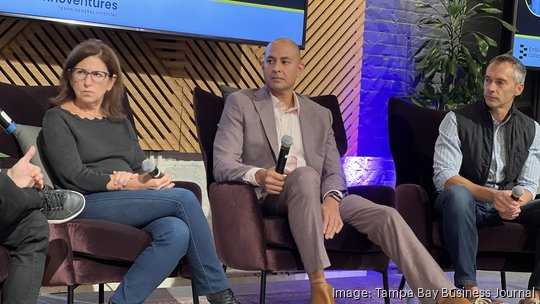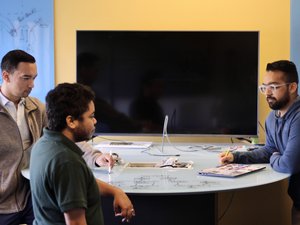
Embarc Collective is no stranger to in-depth conversation.
It hosted its quarterly series, the Tampa Bay Healthtech Meetup hosted by Tampa General Hospital's venture capital arm Innoventures, on Dec. 5, and four panelists from across healthtech batted ideas on improving wearables to fixing issues in U.S. health care access.
The four panel speakers were Jared Taylor, the founder of podcast media company Slice of Media Inc.; Ryan Schneider, an executive adviser at Embarc Collective and founder of a health newsletter; Peter Chang, a doctor and the chief transformation officer at TGH; and Susan Molina, the co-founder and CEO of social impact company Groundgame.health.
It was a wide-ranging conversation, and Tampa Bay Inno rounded up some of the event's key moments, spotlighting how healthtech startups can find success.
On health care companies' willingness to work with early-stage startups
"The two things that scare us the most are IT maintenance and security," Chang said. "... Our biggest vulnerabilities are things that we don't control."
The panelists agreed they live in near-constant anxiety about cyberattacks. The personal data used in health care is exceptionally private and is therefore preyed on regularly. These companies enforce extreme preventative measures, making security a central part of considering partnerships.
The second consideration, Chang said, is the interface and cross-compatibility of the product. That means not just having a good product but potentially considering how it could fit into a larger product's interface, like Epic Systems, a common health care recordkeeping software.
"Anything that you want to do inside a health care system requires an interface into or out of an [electronic medical record]," Chang said.
On finding innovation in the space
"Something that we do all the time in health care — even in our amazing command center that we built that has saved the hospital tens of millions of dollars and made care safer at TGH — is only making an inefficient system more efficient. So is that really the answer?" Chang said.
Startups and companies in the healthtech space should constantly be innovating and trying not just to improve but redesign the available products. It's innovative and better than puzzling away at an ineffective, costly system. It's the more challenging route, but it's possible when considering alternative approaches, for example, instilling preventative care methods instead of treating patient illnesses.
Chang pointed to companies like Kodak or Blockbuster that never pivoted to studying digital cameras or streaming services, and industry disruption put them out of business. Innovation and disruption in the healthtech space could happen similarly.
On what mobile health apps, devices and health platforms should look like
"Everyone's feeding us data; very few are feeding insights," Schneider said.
Many mobile health tech companies are "overloading" users with information instead of delivering health-related intelligence. It's a role that healthtech platforms and even artificial intelligence programs can play. For example, AI-based programs could help pull data from the "crevices" of a complicated platform and present it to a doctor, Chang said.
Companies should focus on the customer by adding analytical judgment and even incentives or incentivizing health through games and aligning data with patient goals.
"There has to be a simplicity in terms of holding all that together. And no one really wants their [electronic medical record], like they don't want what Epic is serving up, what they want is, 'What do I need to do right now to optimize my health?'" Schneider said.
Besides data, there are devices. A good device can't stand alone; it needs a good platform with accessible patient data.
"Devices are commodities," Chang said. "Someone's going to create a longer battery life and a faster processor and a smaller form factor. But very rarely do we really reinvent the platform in which this data is going."
On the likelihood of landing an investment as a tech-enabled service company in health care
"The startup world is hard in general," Schneider said. "I think the probability in health care is even harder."
The last few years have shown that some companies gain too much capital too fast, and people still remember the bets and investments that haven't played out, Schneider said.
A company seeking investment should ask itself if it could succeed without integration into the payer or provider system before continuing to the next phase of capital seeking. It's a way to de-risk and plan for contingencies, he said.









